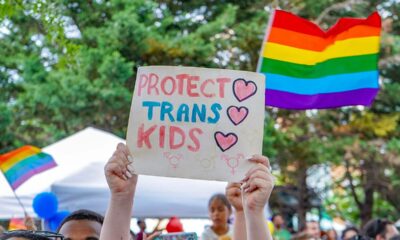Texas
Transgender Texas Kids Terrified After Governor Orders Parents Be Investigated for Child Abuse
Some experts doubt that classifying gender-affirming care as child abuse would hold up in court, but families still feel targeted by Gov. Greg Abbott’s new order

This article originally appeared in The Texas Tribune
 Every couple of months, Adamalis Vigil drives eight hours from the Rio Grande Valley to North Texas so her 13-year-old transgender daughter Adelyn can receive health care. They talk and sing the whole trip.
Every couple of months, Adamalis Vigil drives eight hours from the Rio Grande Valley to North Texas so her 13-year-old transgender daughter Adelyn can receive health care. They talk and sing the whole trip.
The care she receives there is unavailable in her hometown but pivotal to her sense of identity — and her mental health.
“It makes me feel who I truly am, and I don’t feel singled out for not being like other girls in school anymore,” Adelyn said. “It’s just very special for me that mom takes me all the way over there.”
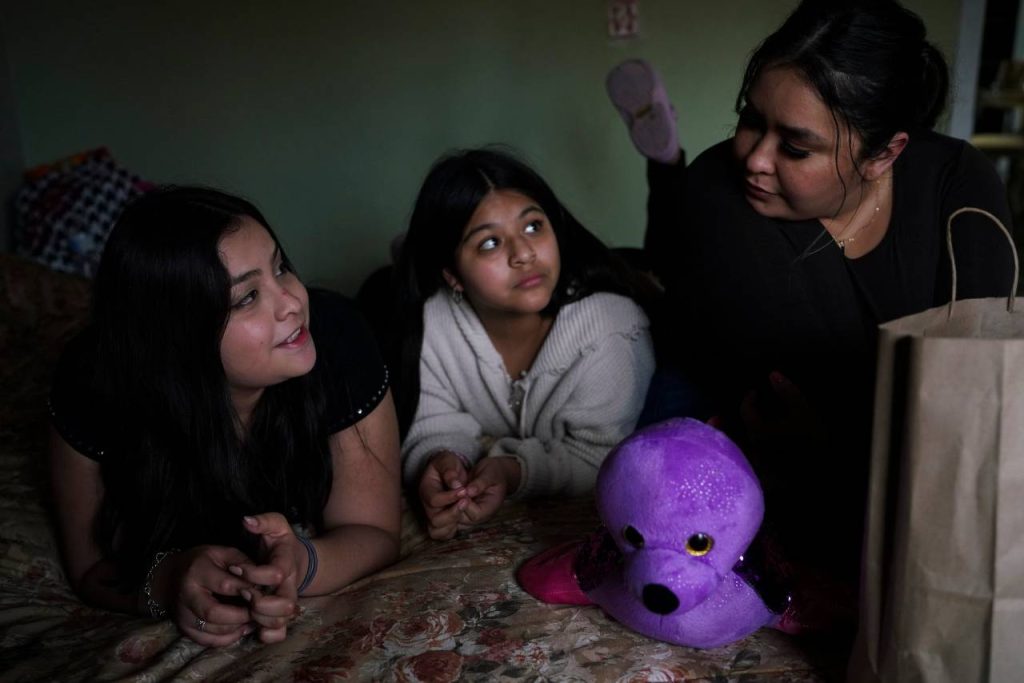
Adelyn — who stands tall at 5 feet, 5 inches and is outspoken in class — had been having panic attacks in school as she approached puberty. After she started seeing the doctors in North Dallas, the attacks stopped.
But last week, the panic attacks started again when Republican Gov. Greg Abbott — seven days before the GOP primary election in which he’s being accused of not being conservative enough — ordered state child welfare officials to launch child abuse investigations into reports of transgender kids receiving gender-affirming care.
Adelyn is terrified she will be forcibly separated from her mother. So great is her anxiety that she doesn’t want to sleep in her own bed. The Vigil family agreed to speak with The Texas Tribune but did not feel safe disclosing details about Adelyn’s medical care.
Abbott’s directive followed a nonbinding legal opinion from Attorney General Ken Paxton — who is also in the fight of his political life in Tuesday’s primary election — that said gender-affirming care constitutes child abuse.
Paxton’s opinion cited body modification surgeries that medical experts say are rarely, if ever, performed on children. But he also said it would be child abuse to administer gender-affirming care that is widely accepted by leading health care groups, like puberty blockers, which are completely reversible. Under the gender-affirming model of care, experts say, more time is spent allowing kids to socially transition instead of focusing on medical treatment.
Shelly Skeen, a senior attorney with Lambda Legal, said it’s highly unlikely that a judge would justify child abuse charges or removal of a child based solely on the use of gender-affirming therapy.
“Texas law has a very clear definition of what child abuse is, and it’s not this,” Skeen said.
Still, the attorney general’s opinion and governor’s directive drew fire from families, lawmakers, doctors, advocates and the White House, among others. Advocates say that calling gender-affirming therapy child abuse could lead to it being weaponized in divorce cases, create legal issues for physicians and therapists who treat transgender youth and empower people to attack the young people themselves — as well as the family members and others who support them.
“It’s not a far stretch to think that you could be harassed, assaulted, killed,” said W. Carsten Andresen, an associate professor of criminal justice at St. Edward’s University in Austin.
Child abuse investigations based on gender-affirming care are almost unheard of in Texas. Officials at the Texas Department of Family and Protective Services say that there have been three reports last week “meeting the description in the AG opinion and Governor’s directive” but offered no other details. No investigations have been launched, officials said.
But families with transgender kids and their advocates say even an attempt at criminalizing certain care further stigmatizes an already vulnerable group of Texans. The officials’ moves also can block access to treatments that can prevent suicide and severe depression caused in part by gender dysphoria — discomfort related to feeling a disconnect between one’s personal gender identity and the gender assigned at birth.
A recent study showed that more than 40% of transgender youth attempt suicide. The rate of suicide attempts among transgender youth is three times higher than among their cisgender counterparts, according to recent studies by the U.S. Centers for Disease Control and Prevention.
And the moves now leave Texas families with transgender children choosing between getting their children health care that medical experts recommend or possibly facing a child protective services investigation.
“I know I have to fight. I know I have to speak up. I know I have to show up for her. But how do I alleviate her stress when I’m stressed?” Adamalis said. “The fact that she has to do the fighting, too — it’s just terrible. She had to mature so much faster than kids her age.”
Riding a wave of anti-trans politics
Abbott and Paxton have spent the past year reflecting and stoking anti-transgender sentiment among voters — many of them stirred by right-wing media. The public pressure was so intense that a Dallas program that specialized in helping transgender young people was formally dissolved.
In his statement this week, Abbott even called on other Texans to act as watchdogs and report any parents for abuse if they believe the parent is supporting their child’s gender transition with professional help.
For years, the GOP-dominated Texas Legislature has targeted transgender Texans. In 2017, lawmakers unsuccessfully sought to ban people from using bathrooms that don’t match the sex they were assigned at birth. Last year, they succeeded in limiting athletic participation by transgender students. Last year during the regular legislative session, Texas filed more anti-LGBTQ bills than any other state legislature, according to Equality Texas, which tracks such legislation.
Among the proposals was a bill that would explicitly classify some gender-affirming care as child abuse. The Texas Senate passed the bill, but the legislation died in the House.
The opinion and new directive that aim to achieve the same effect without a law passing further stigmatizes an already marginalized group by normalizing speech and actions that target them, Texas House Democrats wrote this week in a letter blasting the comments by Abbott and Paxton.
“Transphobic and false statements like those made by the Governor and the Attorney General have produced an unsafe environment in our state that has forced families to flee to protect their transgender kids, adversely affected the mental health of gender expansive youth, and perpetuated an epidemic of violence against transgender Texans, especially Black trans women,” the letter from several Democratic lawmakers read.
On Thursday, district attorneys from five Texas counties — including Dallas, Bexar, Harris and Travis — took to Twitter to bash the directives as “anti-trans” and “life-threatening” and saying they would not treat gender-affirming actions as abuse.
“We want to assure our residents with transgender children that they are safe to continue seeking the care their children need,” a joint statement said.
Harris County District Attorney Kim Ogg said she would not prosecute “any parent, any facility, or anyone else for providing medically appropriate care to transgender children.”
“As a member of the LGBTQ community myself, I am particularly sensitive to the invidious nature of this order — it turns family members against each other at the expense of their children,” Ogg said in a statement. “It is a remnant of a hateful past that I had hoped our society had matured beyond.”
Second-guessing more care
Since Adelyn’s mother sat her down and told her about the governor’s order, the teen has been reconsidering whether she wants to go to her next doctor’s appointment. She has been scrolling through TikTok videos about the order until her mother comes home from work. On Thursday, she tried to watch a Percy Jackson movie as a distraction, but the fear has been getting to her.
“When I’m at work, she keeps calling and calling: ‘When are you going to be home and how long? How much longer? Are you almost home?’” Adamalis said. “It affects her in that sense that she wants to feel that kind of security and feel safe around me.”

Five years ago, Libby Gonzales, a transgender girl, and her family told Texas lawmakers about how she never wanted to be forced into the boys’ bathroom at school, and that the idea scared her. They traveled to the Capitol to speak out against the now-infamous “bathroom bill,” which would have limited which public bathrooms transgender Texans can use. That legislation, though, died despite several attempts at getting it through the Legislature.
“I am 7 years old and I am transgender,” the nervous girl told the powerful state senators looking down at her from the dais in 2017. “Please keep me safe. Thank you.”
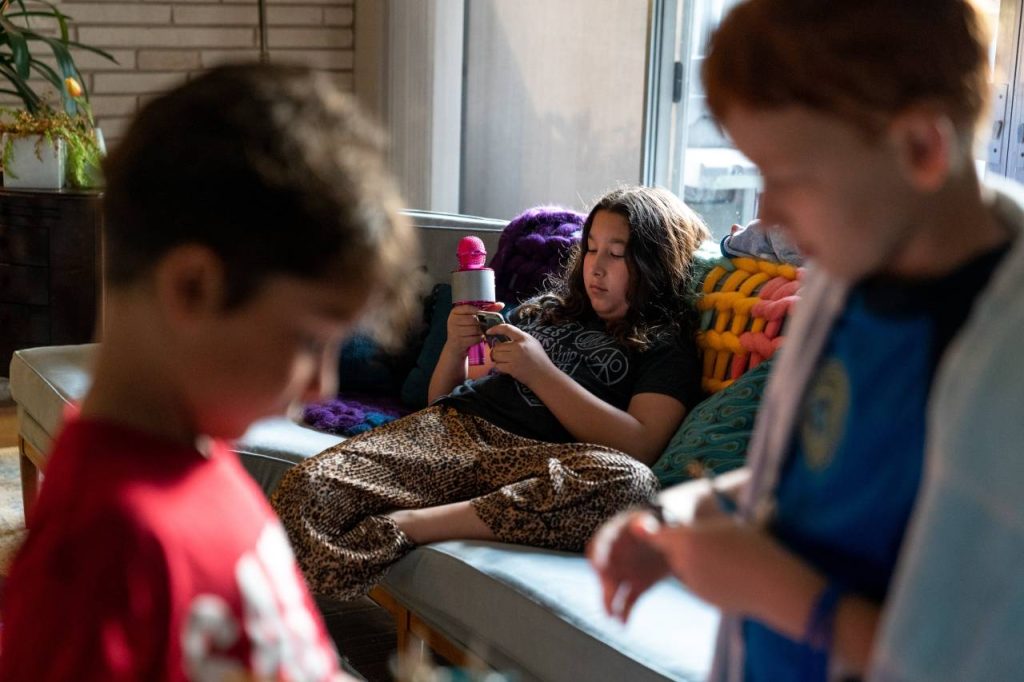
Today, Libby, now 11, and her family do not feel safe confirming or denying her experience with gender care anymore.
Her family — outspoken opponents of Texas Republicans’ near-constant efforts to curtail the rights of her daughter and other transgender youth — are now afraid that their efforts to support Libby will be called criminal by the most powerful men in the state.
As a result of the directive, Rachel Gonzales, Libby’s mother, has developed plans in case Texas Child Protective Services shows up at her Dallas home.
“There are so many hypotheticals that my husband and I talked through.” Gonzales said. “We have to have a plan in place. It also just helps me sleep at night.“
Skeen, the Lambda Legal attorney, said political rhetoric against transgender children is already driving families out of the state. But the Gonzales family said they are here to stay.
“My daughter is a fifth-generation Texan. We’re simply not leaving our home because of some bullies in the Texas [Legislature],” Gonzales said.
Extremely rare
While child abuse investigations of gender-affirming care are rare, there is at least one well-known example: a DFPS investigation into the family of a transgender child over the use of gender-affirming therapy, a bitter custody battle fueled by the blogger father of a 7-year-old girl who was assigned male at birth.
In 2019, Abbott and Paxton demanded that the state’s child welfare agency investigate whether the child’s mother was committing abuse by letting the child present as a girl. At the time, the move alarmed an already fearful community of parents of transgender children.
In that case, in which no surgical or hormonal procedures were used, child welfare officials ruled out child abuse and closed the investigation. The father, Jeff Younger, lost custody of his two children in the divorce, according to his website.
Younger is now running for the Republican nomination to the Texas House in his Flower Mound district in Tuesday’s primary. He could not be reached for comment.
In their statement this week, Texas House Democrats said gender-affirming therapy is still legal for transgender youth and supported by medical professionals and that mandatory reporting laws had not changed.
And in spite of child welfare officials saying earlier this week that they would comply with Abbott’s orders, the Democratic lawmakers said no government agency “is obligated to comply with the directive of the Governor or enforce the false assertions made by the Attorney General.”
CPS investigations are only launched if “an allegation is reported, and if the allegation meets the legal definition of abuse or neglect,” said DFPS spokesperson Patrick Crimmins.
In general, CPS investigators who find evidence of abuse may decide to set up services for the family to remove the threat to the child or stage some other intervention. In extreme cases, they may ask for an order from a judge to either temporarily or permanently remove children from the home.
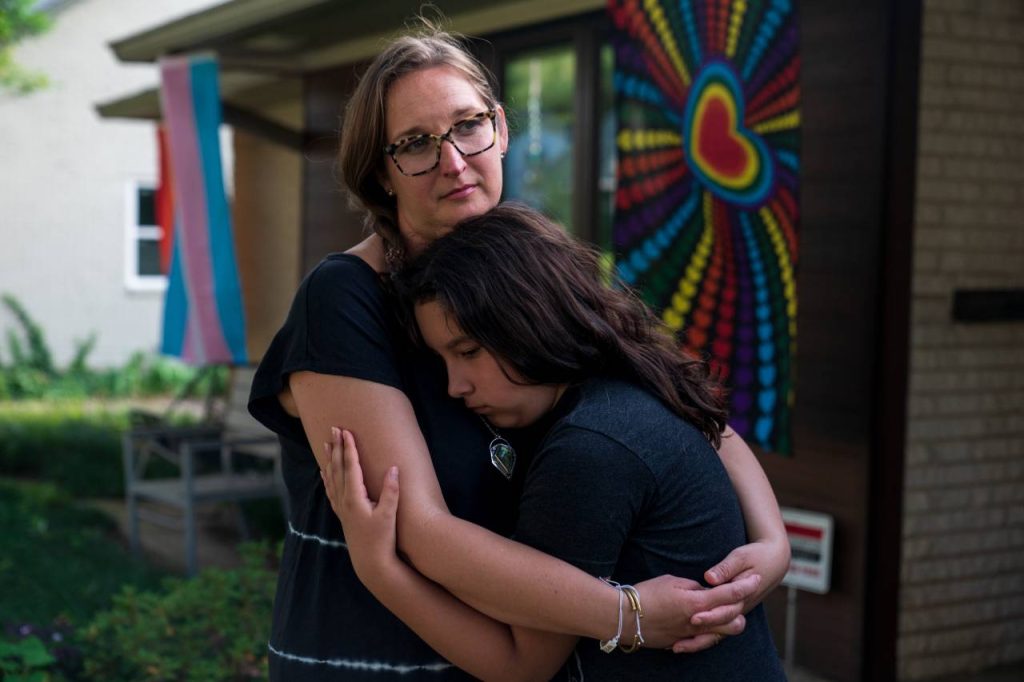
Their worst fear
Still, transgender kids Libby knows “are freaking out, coming home from school crying. I mean, she also has cried a lot,” Rachel Gonzales said. “That would cause irreparable harm to any family and any child to remove a kid from their home in a state where the government is very intentionally trying to hurt them.”
Even an investigation itself can be traumatic, life-altering and invasive, Andresen said. A DFPS investigator may interview family members and others familiar with a family or the child in order to decide whether there is reason to believe abuse is taking place or whether to rule it out, among other possible outcomes.
“Parents that have the money and resources are seriously thinking about looking to move outside of Texas,” said Andresen, whose wife sometimes works with transgender families in her job as a family attorney. “Even if there is no legal grounds, why would you stay here with somebody threatening to investigate you?” Also, any protection under the law could be wiped away easily if Texas lawmakers — an increasingly conservative bunch — decide to change the code, which could effectively make gender-affirming therapy for minors illegal in Texas.
Adelyn’s care has “really been life-changing” for the Rio Grande Valley girl, her mother said.
“How is that considered child abuse to accept them and love them?” Adamalis Vigil asks. “How can they overstep their power and try to come and tell me how I should love my child?”
Karen Brooks Harper contributed to this story.
Disclosure: Equality Texas has been a financial supporter of The Texas Tribune, a nonprofit, nonpartisan news organization that is funded in part by donations from members, foundations and corporate sponsors. Financial supporters play no role in the Tribune’s journalism. Find a complete list of them here.
The Texas Tribune is a nonpartisan, nonprofit media organization that informs Texans — and engages with them – about public policy, politics, government and statewide issues.
Education
Texas colleges launch course reviews amid push to limit gender identity instruction
After a viral video stirred controversy at Texas A&M, Texas Tech ordered course adjustments while other university systems like UNT and UT launched reviews. It’s unclear what the reviews will look for.
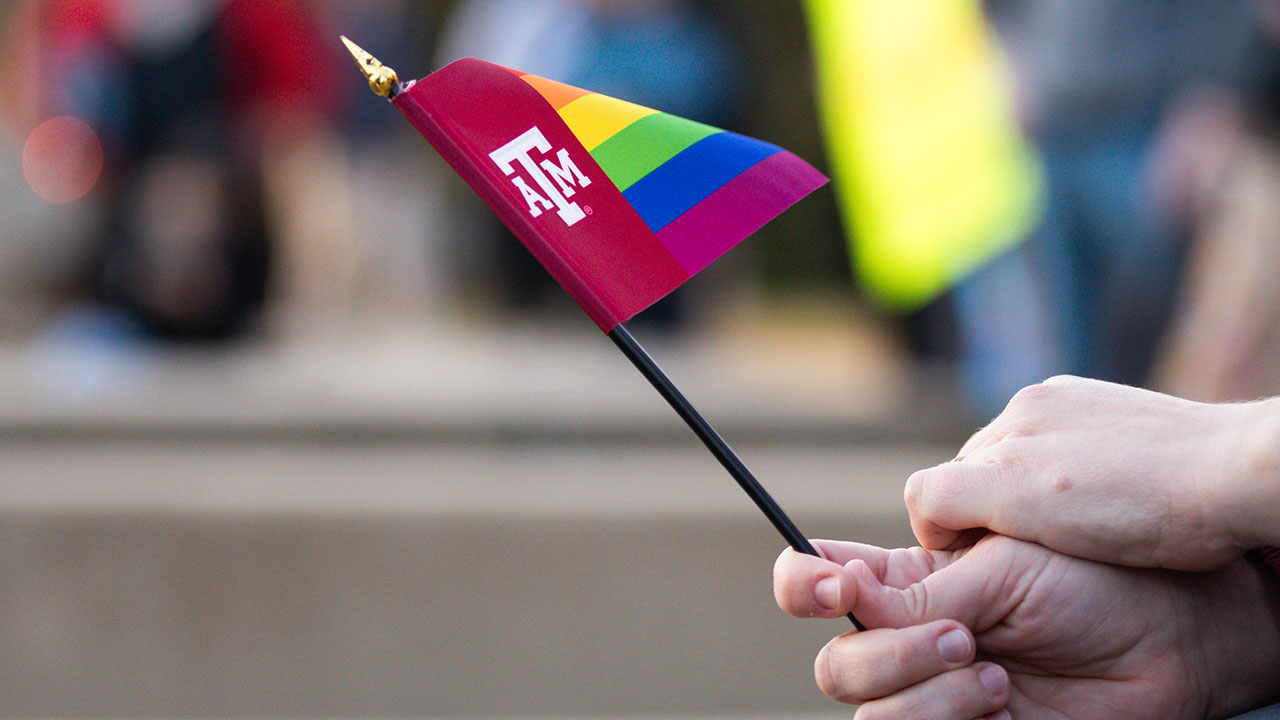
This article originally appeared in The Texas Tribune
 Last month, a viral video showing a Texas A&M University student confronting a professor over a discussion of gender identity during a children’s literature class sparked a firestorm in Texas higher education that has led other schools to review their academic offerings.
Last month, a viral video showing a Texas A&M University student confronting a professor over a discussion of gender identity during a children’s literature class sparked a firestorm in Texas higher education that has led other schools to review their academic offerings.
Texas A&M fired the professor in the video and former university President Mark A. Welsh III resigned. Seeking to preempt any similar controversy, the Texas Tech University System issued guidance last week instructing faculty to ensure that their courses comply with a federal executive order, a letter from Gov. Greg Abbott and a new state law that recognizes only two sexes.
Faculty and LGBTQ+ advocates fear the directive will limit classroom discussion of transgender and nonbinary identities. They warn the universities’ actions are the byproduct of political interference that threatens academic freedom and the quality of higher education in the state.
Brian Evans, president of the Texas Conference of the American Association of University Professors, said administrators should enable students to learn the widest set of topics by ensuring faculty can speak freely. He added that colleges and universities “have an obligation to develop campus policies that protect the Constitutional rights of their faculty to teach and research the subjects in their areas of expertise without intimidation or censorship.”
No law explicitly bars teaching topics like gender identity or the existence of more than two sexes. But Texas universities know their courses are under the microscope, with politicians and activists combing through catalogs and syllabi and demanding changes to any material they consider objectionable.
In the heels of Texas Tech’s guidance, at least three public university systems — the University of North Texas, the University of Texas and Texas Woman’s University — have ordered course reviews. They have framed the effort as ensuring compliance with state and federal law. But UT, UNT and TWU, unlike Texas Tech, did not specify which laws triggered the reviews. The systems did not say what actions their schools would take after the reviews.
Public universities are required to conduct curriculum reviews under Senate Bill 37, passed this year, but the first reviews aren’t due until 2027. The law directs governing boards to examine whether general education courses “are necessary to prepare students for civic and professional life” and “ensure a breadth of knowledge.” Earlier versions of the bill went much further, barring courses from promoting the superiority of any race, sex or religion, or from endorsing specific public policies or ideologies, but that language was cut before passage.
Here’s what public university systems and community colleges in the state have said so far:
Texas A&M University System
Chancellor Glenn Hegar announced on Sept. 9 a systemwide audit of course offerings, a day after Rep. Brian Harrison, R-Midlothian, posted a secretly recorded video of the children’s literature class.
The clip went viral, and within days, professor Melissa McCoul was fired, the dean of the College of Arts and Sciences and the head of the English Department were removed, and Welsh resigned under pressure from state leaders who said he had mishandled the controversy.
Hegar has not publicly detailed how the course review will be carried out or what criteria will be used.
Texas Tech University System
Chancellor Tedd Mitchell directed the presidents of the system’s five universities to review course materials, syllabi and curricula.
In a Sept. 25 letter, Mitchell told the university presidents to “make timely adjustments where needed” to comply with President Donald Trump’s Jan. 20 executive order, Gov. Greg Abbott’s Jan. 30 letter and House Bill 229, all of which recognize only two sexes, male and female. None of them directly requires or mentions restrictions on teaching.
“While recognizing the First Amendment rights of employees in their personal capacity, faculty must comply with these laws in the instruction of students, within the course and scope of their employment,” Mitchell wrote.
The order offered no details on how the reviews would be conducted, leaving faculty uncertain about what changes might follow and drawing criticism from free speech and LGBTQ+ advocates who called it censorship and accused it of being cruel to trans and nonbinary students.
Mitchell’s directive came after Angelo State University, part of the Texas Tech System, told faculty they could not discuss transgender and nonbinary identities in their classes, making it the first known public Texas university to restrict classroom acknowledgment of such gender identities.
University of North Texas System
On Sept. 29, Chancellor Michael Williams directed each UNT System institution to conduct an expedited review of its academic courses and programs, including a complete syllabi review, to ensure compliance with “all current applicable state and federal laws, executive orders, and court orders.” Campuses have until Jan. 1 to finish the reviews.
Although Williams’ letter did not mention Trump’s executive order, Abbott’s letter or House Bill 229 like Mitchell’s directive did, a UNT system spokesperson told The Texas Tribune they will be considered in the course reviews. But when asked whether the system believes those measures prohibit schools from teaching that there are more than two sexes, or what the reviews will specifically look for, the spokesperson said only that those questions “will be discussed in the reviews.”
University of Texas System
A UT System spokesperson told the Tribune that the system is reviewing “gender identity” courses across all campuses “to ensure compliance and alignment with applicable law and state and federal guidance, and to make sure any courses that are taught on UT campuses are aligned with the direction and priorities of the Board of Regents.” The review will be discussed at the regents’ November meeting, the spokesperson said.
The UT System did not cite any specific measures that had triggered the reviews. The spokesperson did not say whether the system was interpreting and applying the president’s executive order, the governor’s letter or House Bill 229 in the same way as Texas Tech did.
The UT System also did not clarify what “reviewing gender identity courses” means in practice or whether it intends to prohibit or alter such classes.
University of Houston System
The system did not respond Tuesday to the Tribune’s request for comment.
Texas State University System
The system did not respond Tuesday to the Tribune’s request for comment.
Texas Woman’s University System
Texas Woman’s University System is “in the process of establishing a review of academic courses and programs, in accordance with all applicable state and federal laws,”a spokesperson said. The system, which is the state’s newest and smallest with campuses in Denton, Dallas and Houston, did not specify what the review will look for or whether it could result in changes to courses or programs.
Community colleges
In the Houston area, San Jacinto College “has made faculty and staff aware” of Trump’s executive order, Gov. Abbott’s letter and House Bill 229, according to Amanda Fenwick, a spokesperson for the college. Faculty have been instructed to do a review of course content, she said.
“San Jacinto College is committed to understanding and following federal and state laws and ensuring that all employees — including faculty — are compliant,” Fenwick wrote in a statement to the Tribune.
As part of the review, faculty have been ordered to ensure course content is aligned with student growth goals, which are in the Texas Higher Education Coordinating Board’s Academic Course Guide Manual and Workforce Education Course Manual, Fenwick said.
Texas has 50 community colleges. It is unclear if any other school is planning to review their courses. The Tribune also reached out to Alvin Community College and Blinn College, but they have not responded.
Sneha Dey contributed to this story.
The Texas Tribune partners with Open Campus on higher education coverage.
Disclosure: Texas Tech University System and University of North Texas have been financial supporters of The Texas Tribune, a nonprofit, nonpartisan news organization that is funded in part by donations from members, foundations and corporate sponsors. Financial supporters play no role in the Tribune’s journalism. Find a complete list of them here.
The Texas Tribune is a nonpartisan, nonprofit media organization that informs Texans — and engages with them – about public policy, politics, government and statewide issues.
Education
Feds investigate another Texas school district for its gender identity mandate
Katy ISD’s board voted this past fall to require staff to notify parents if their child wants to use a different pronoun or identifies as a different gender.

This article originally appeared in The Texas Tribune
 The U.S. Department of Education’s Office for Civil Rights opened an investigation Monday into Katy Independent School District’s gender identity policy on the basis of gender harassment under Title IX. The investigation came nine months after the Houston Landing reported that the district adopted a policy that notifies parents if their child requests to use a different name or pronouns at school.
The U.S. Department of Education’s Office for Civil Rights opened an investigation Monday into Katy Independent School District’s gender identity policy on the basis of gender harassment under Title IX. The investigation came nine months after the Houston Landing reported that the district adopted a policy that notifies parents if their child requests to use a different name or pronouns at school.
Katy ISD did not respond to a request of how many parents have been notified this year under the new policy, which requires staff to inform parents that students are transgender or ask to use different names or pronouns.
The Houston Chronicle reported in December that the district had notified parents at least 23 times since the policy was adopted.
The gender identity policy also bars schools from teaching “gender fluidity” and denies students from competing in sports with the gender they identify with, which mirrors state legislation already regulating K-12 athletics.
Students Engaged in Advancing Texas, a student-led advocacy group, filed a complaint with the U.S. Department of Education in November regarding the policy. Katy ISD graduate and member of SEAT Cameron Samuels labels the investigation as a win against the conservative policies being passed in the district.
“Elected solely on platforms to target marginalized students, far-right school board candidates accomplished exactly what they were elected to do: weaponize identity and neglect students’ educational needs,” they said.
Title IX prohibits sex-based discrimination in educational settings or federally funded activities. Gov. Greg Abbott has loudly voiced his opposition to the federal law recently ordering the Texas Education Agency to disregard the Biden administration’s expansion of Title IX.
“The district is committed to offering equal educational opportunities to our entire community,” a spokesperson from Katy ISD told the Tribune in a response to the investigation. “While we have received the OCR filing and deny any wrongdoing, we are committed to remaining fully cooperative and responsive throughout the process.”
Victor Perez, Katy ISD board president and proponent of the policy, argued that the policy was “mischaracterized” by community members as an attack on its queer and transgender students and instead relieves the burden for staff withholding information from parents. The policy was passed at a board meeting in August with a vote of 4-3 after four hours of public comment.
Alastair Parker, a member of the Cinco Ranch High School Gender-Sexuality Alliance, spoke at the board meeting in opposition to the policy.
Parker and others argued that the policy infringes on the rights of transgender kids to express themselves and opens them to potential harm if they are outed to transphobic parents or caregivers.
Johnathan Gooch from Equality Texas, a nonprofit advocacy group for LGBTQ+ Texans, said he hopes students recognize their power to report policies like this in the wake of the increasing number of legislation targeting LGBTQ+ youth.
This isn’t the first instance in Texas of a gender related policy being investigated on the federal level. Carroll ISD in Tarrant County was reported to have eight open investigations last February after it eliminated protections over race, religion, gender and sexual orientation.
There are documented mental health benefits to using preferred pronouns. A research team at the University Texas at Austin conducted a study in which they concluded that students in gender-affirming environments report 71% fewer symptoms of severe depression, a 34% decrease in reported suicidal ideation and a 65% decrease in suicide attempts.
“When students place their trust in teachers and school administration, the school has a duty to preserve that trust,” Gooch said. “That duty requires schools to ensure that no disclosure would place a student in harm’s way.”
Parker has been out as a transgender man since the seventh grade and is supported by his father, who he resides with. He acknowledged that this isn’t the case for many of his classmates as some have parents that are less accepting.
His teachers have gone by his preferred name and pronouns for his entire high school experience. But since the policy has been enacted, he has seen some of his peers go by their deadnames fearing that their parents would be notified.
Over the past year, other schools across the state have adopted similar policies.
Keller ISD, which is also in Tarrant County, passed a policy in late June that prevents students from using their preferred name and pronouns or using restrooms with the gender they identify with.
The policy was met with retaliation from the Texas American Civil Liberties Union, writing in a letter to the district that the policy is “deeply invasive and unlawful for school administrators to interrogate students’ private medical information in this way.”
As the end of the school year nears, Parker observed the policy being enforced at varying levels of severity by teachers. The passing of legislation or policy like this deters from the ongoing health crisis for queer and transgender youth and is wholly unnecessary, he said.
“If a child’s not telling their parents something like that, it’s for a reason,” he said. “I know that most of the people who are in favor of this are the ones who bounce off whatever their parents have told them to repeat.”
Disclosure: Equality Texas has been a financial supporter of The Texas Tribune, a nonprofit, nonpartisan news organization that is funded in part by donations from members, foundations and corporate sponsors. Financial supporters play no role in the Tribune’s journalism. Find a complete list of them here.
The Texas Tribune is a nonpartisan, nonprofit media organization that informs Texans — and engages with them – about public policy, politics, government and statewide issues.
Amarillo
Appeals court considers whether West Texas A&M drag show was unconstitutionally banned
University President Walter Wendler canceled a drag performance last year, claiming such shows “denigrate and demean women.”
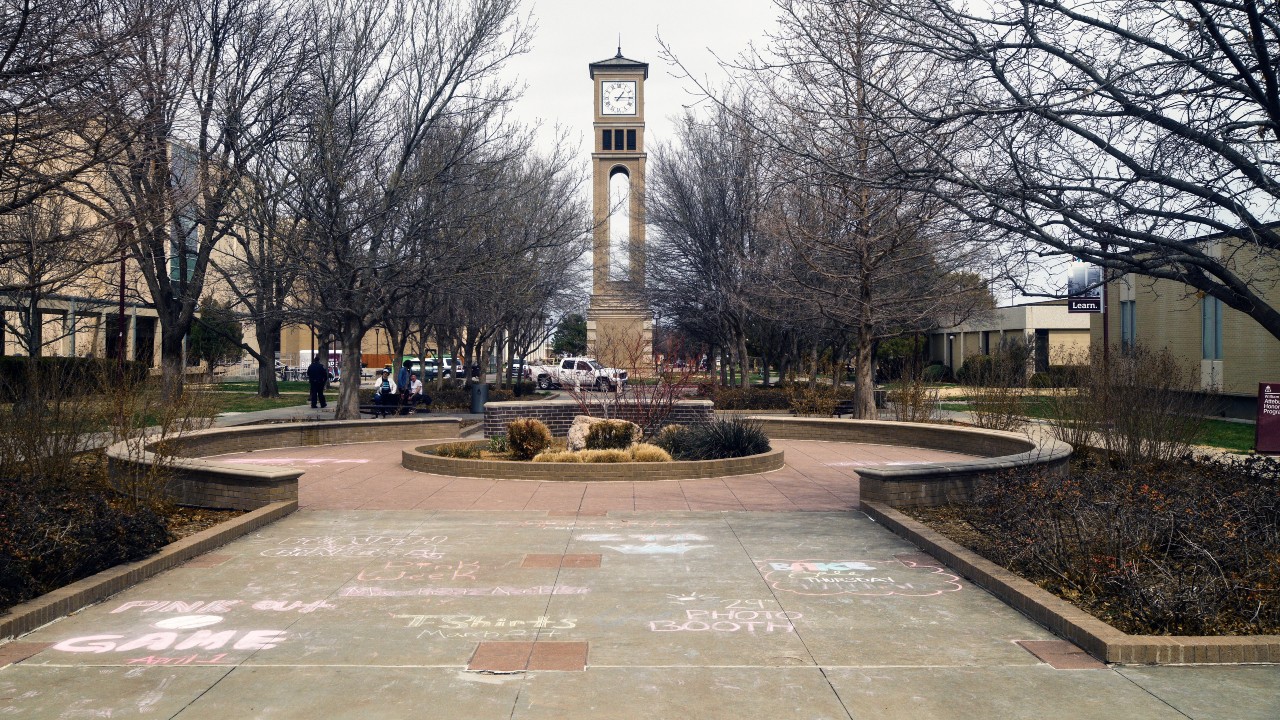
This article originally appeared in The Texas Tribune
 A federal appeals court considering whether West Texas A&M University’s president violated the First Amendment when he canceled a campus drag show last year focused many of their questions Monday on a U.S. Supreme Court ruling that upheld campus non-discrimination policies.
A federal appeals court considering whether West Texas A&M University’s president violated the First Amendment when he canceled a campus drag show last year focused many of their questions Monday on a U.S. Supreme Court ruling that upheld campus non-discrimination policies.
But the panel of three judges used that 2010 case — which said universities can require groups to admit LGBTQ+ students — to suggest that school officials could also ban drag shows because some people find the performances offensive to women.
A lawyer representing a group of West Texas A&M students who’ve twice attempted to host a drag show on campus argued before the 5th U.S. Circuit Court of Appeals Monday that President Walter Wendler discriminated based on viewpoint and censored speech when canceling the performances.
In March 2023, Wendler banned drag shows in response to a student fundraiser that featured drag performers. The president argued the performances “denigrate and demean women,” and shouldn’t be allowed on the public university’s campus.
In September, a federal judge said Wendler acted within his authority to cancel the drag show. In his opinion, U.S. District Judge Matthew Kacsmaryk wrote, at “this point in Free Speech jurisprudence, it is not clearly established that all ‘drag shows’ are categorically ‘expressive conduct.’”
Last month, students with WT Spectrum, the student group at the university, hoped to hold another drag show on campus — to show support for the LGBTQ+ community in a staunchly conservative corner of Texas.
With Wendler’s campus-wide ban still in place, the Supreme Court declined to intervene and the president again ordered the fundraiser from taking place.
The panel of judges hearing the appeal Monday were James Dennis, James Ho and Leslie Southwick.
Many of their questions centered around Christian Legal Society v. Martinez, a case in which the Supreme Court upheld a policy of the University of California, Hastings College of the Law, that bars student groups from excluding members based on status or beliefs.
In 2010, the Supreme Court affirmed that Hastings’ policy does not violate the First Amendment rights of CLS, a group of students that wanted to be officially recognized on campus while not allowing people who engage in “unrepentant homosexual conduct” from joining.
The 5th Circuit judges Monday seemed to suggest that Wendler’s ban was no different from the policy at the center of the 2010 Supreme Court case. One of the judges, who didn’t identify themselves before speaking, asked if plaintiffs intended to use the case in question to overturn CLS.
“Maybe we should overturn CLS?” one of three judges said. “Many people would like CLS overturned.”
Ho equated the policy upheld in CLS with Wendler’s drag ban. He said both intend to make everyone feel included, but the policies have the consequence of targeting one group. In CLS’ case, he said that Christians were singled out on Hastings’ campus for not allowing LGBTQ+ individuals to join. Ho said that previous groups on Hastings’ campus could exclude members, but CLS was singled out by the university’s non-discrimination policy.
JT Morris, senior attorney for the Foundation for Individual Rights and Expression who represented the students, argued that the judges were comparing “apples to oranges” between the two cases.
Morris argued CLS is about a content-neutral policy, while Wendler was clearly discriminating based on viewpoint.
“The First Amendment does not allow the government to use the subjective term ‘offensive’ to restrict speech,” Morris said.
Joseph N. Mazzara, a lawyer with the Texas Attorney General’s Office who represented Wendler, said the students had not suffered any injury as a result of the no-drag policy because there was no future event featuring drag performers planned. Additionally, Mazzara said Wendler’s policy carried no criminal penalties and students could host drag performances off campus.
Mazzara said Wendler’s ban was not a free speech violation, but rather it was akin to banning certain conduct, like skateboarding on the grounds of a monument. He said drag shows constituted conduct, not speech.
“They’re able to do everything they want to do, they’re able to say all the speech they want to [say],” Mazzara said, referring to the student group WT Spectrum. “They just can’t do this one particular thing in this one particular place.”
A judge asked Mazzara how the university would have treated drag shows put on by other student groups, such as a fraternity. The judges seemed to agree with Mazzara that Wendler’s restriction did not target a specific viewpoint.
“If a Christian legal group wanted to have a ‘Drag for Jesus’ event that would also be banned,” Mazzara said.
One judge suggested that some drag shows are offensive to the transgender community, and thus Wendler’s ban would equally protect that population from offensive performances.
Allison Marie Collins, another lawyer from the Attorney General’s Office representing other defendants named in the lawsuit, argued the appellate judges should not impose any restrictions on Texas A&M system Chancellor John Sharp or West Texas A&M Vice President for Student Affairs Christopher Thomas. She argued an injunction against Sharp or Thomas would be overbroad, because it’s clear that only Wendler has acted to stop these shows.
“Neither Chancellor Sharp nor Dr. Thomas have remotely engaged in viewpoint discrimination, exclusion from a public forum or a prior restraint complaint to speech,” Collins said.
In his rebuttal, Morris argued the plaintiffs have standing over Sharp because he has the authority over Wendler to put an end to this restriction on free speech.
“He has the authority to do what’s best for the campus,” Morris said of Sharp. “He should have put an end to this prior restraint, which shouldn’t have lasted a day, and has now lasted a year.”
Disclosure: Texas A&M University and West Texas A&M University have been financial supporters of The Texas Tribune, a nonprofit, nonpartisan news organization that is funded in part by donations from members, foundations and corporate sponsors. Financial supporters play no role in the Tribune’s journalism. Find a complete list of them here.
The Texas Tribune is a nonpartisan, nonprofit media organization that informs Texans — and engages with them – about public policy, politics, government and statewide issues.






